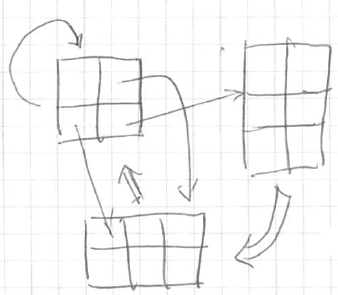Repeated Game
Repeated Games
Utility
- the sequence of utility is infinite
- how to write it?
- average reward
- $\lim_{k \rightarrow \inf} \sum_{j-1}^{k} \fraq{r_j}{k}$
- discounted utility
- players care about future less than about present
- $\beta$ - discount factor ($0 < \beta < 1$)
- future discounted reward: $\sum_{j=1}{\inf} \beta ^j r_j$
- $\beta$ can be seen as an “interest rate”
- with probability $(1 - \beta)$ game may finish
Stochastic games
- generalization of repeated games
- informal visualization
- <img src=”
 ” />
” />
Learning in Repeated Games
- all players learn as they go
- fictitious play (model-based learning)
- initially - method for computing a NE
- each player maintains explicit beliefs about the other players
- algorithm
- initialize beliefs about opponent’s strategy
- each turn
- play a BR to the assumed strategy
- observe actual play and update beliefs
- consider matching pennies
- won’t converge to a specific value
- but empirical frequencies will converge to a NA
- No-regret learning
- regret
- regret of an agent is experienced at time t for not having played strategy s
- $R^t(s) = \alpha ^t - \alpha^t (s)$
- $\alpha ^t$ - payoff player actually gets
- $\alpha ^t(s)$ - payoff we would have received, if had played s
- no-regret rule
- a learning rule exhibits no regret
- if for any pure strategy of the agent s
- $Pr[\lim \inf R^t(s)] \leqslant 0) = 1$
- (if player shows no regret)
- regret matching
- look at the regrets you’ve experienced so far
- and pick a pure strategy in proportion to this regret
- $\sigma _i ^{t+ 1} = \freq{ R^t(s) }{ \sum _{ s’ \in S_i } R^t (s’)$
- sum in the denominator - sum of all regrets
- value in the numerator - a particular regret
- $\sigma_i ^{t + 1}$ - probability that agent $i$ plays $s$ at time $t+1$
- so it converges to equilibrium
Equilibrium of Inf. Repeated Games
- pure strategy
- action on every stage
-
| given you remember anything |
|
- history, etc |
- so it’s an infinite set |
- example strategies for Prisoner’s Dilemma
- Tit-for-tat
- start out cooperating
- if opponent defects, defect next round
- then go back to cooperation
- Trigger
- start out cooperating
- if opponent defects, defect for ever
- idea
- we can characterize a set of payoffs that are achievable under equilibrium
- without having to enumerate the equilibria
- (the number of equilibria is infinite)
- definitions
- let $v_i = \min_{s_{-i} \in S_{-i}} \max _{s_i \in S_i}$
- $v_i$ - minimax value
- the amount of utility $i$ can get
- when $-i$ play a minmax strategy against him
- so it’s the value $i$ will get if others want to hurt him as much as they can
- enforceability
- a payoff profile is enforceable if $r_i \geqslant v_i$
- i.e. if everybody’s payoff is at least their minmax value
- feasibility
- a payoff profile is feasible if
- there exists rational non-negative values $\alpha_a$
- such that for all i we can express r_i as
- $\sum_{a \in A} \alpha_a u_i(a)$
- and $\sum_{a \in A} \alpha_a = 1$
- so it says that it is possible to have this payoff
- Folk theorem
- consider any n-player game $G$ and any payoff vector $(r_1, …, r_n)$
- first
- if $r_i$ is the payoff of any NE of $G$, then for player i it’s enforceable
- i.e. greater than or equal to his/her minimax value
- second
- if r is both feasible and enforceable
- then $r$ is the payoff in some NE of $G$
- so, enforceability and feasibility - things you need to find NE
- as long as you meet these 2 conditions, you have a NE
Discounted Repeated Games
- motivation
- the future is uncertain
- we are often motivated by what happens today
- will people punish me if I misbehave today?
- is it in their interest?
- do I care about the future?
- discount factor
- stage game : $(N, A, u)$
- Discount factor $\beta_1 … \beta_n, \beta_i \in [0, 1]$
- $\sum_t = \beta_i^t u_ (a^t)$
- Histories
- Histories of length t
- $H^t = { h^t : h^t = (a^1, …, a^t) \in A^t }$
- (what everybody did on t period of time)
- all histories: $H = \bigunion_t H^t$
- Prisoner’s Dilemma
- $A_i = {C, D}$
- History: (C, C) (C, D) (D, D)
- a strategy for period 4 would specify what a player would do after seing the history
- Subgame perfection
- subgame
- subgame starts at a particular $t’$
- and contains everything that remains
- subgame perfection
- take $t’$
- play NE
- and NE will be for ever on
- i.e. no matter that the history is, playing a NE would lead to a subgame perfection
- Prisoner’s Dilemma
- game
- consider trigger strategy
- if cooperate, they will have
- $3 + 3\beta + 3\beta^2 + … = \frac{3}{1 - \beta}$
- if defect
- $5 + \beta + \beta^2 + … = 5 + \beta \frac{1}{1 - \beta}$
- difference (we want to sustain (C,C))
- $\beta \frac{2}{1 - \beta} - 2 \geqslant 0$
- $\beta \geqslant 0.5$
Sources
 ” />
” />